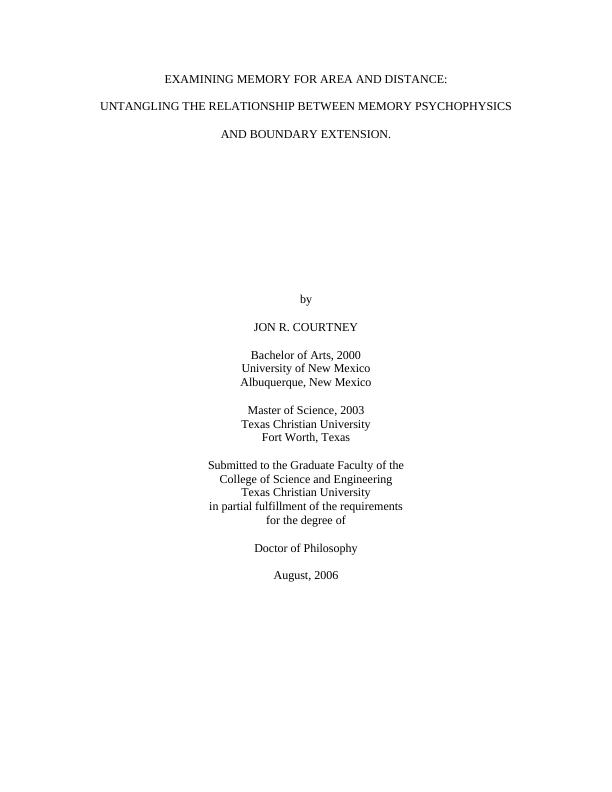Examining memory for area and distance: untangling the relationship between memory psychophysics and boundary extensionShow full item record
| Title | Examining memory for area and distance: untangling the relationship between memory psychophysics and boundary extension |
|---|---|
| Author | Courtney, Jon R. |
| Date | 2006 |
| Genre | Dissertation |
| Degree | Doctor of Philosophy |
| Abstract | When an observer views a picture of a scene, his or her memory for that scene often includes details that were not present in the scene, but that might have been present just outside the boundaries. This has been referred to as boundary extension (Gottesman & Intraub, 2003; Intraub, 2004; Intraub & Richardson, 1989), and has been proposed to reflect the anticipatory nature of representation (Intraub, 2002). One possible contributing factor to boundary extension is a change in remembered distance (Hubbard, 1996). However, memory psychophysics studies examining memory for distance have found that people most often remember being closer to an object than they were at first sight, which would seem to reflect boundary restriction rather than boundary extension (Algom, 1992).^The purpose of the four experiments presented in this dissertation were to find (a) if results such as those found in boundary extension and elsewhere are due to changes in remembered distances of objects,(b) apply theories drawn from boundary extension to ecologically rich stimuli, and (c) resolve inconsistencies between research on boundary extension and memory psychophysics. Experiments 1 and 2 examined memory for distance of close-up 3-D views by asking participants to step forward or backward and adjust themselves to the position in which they first viewed a scene. Results were consistent with memory psychophysics and not boundary extension in that participants generally remembered being closer to the scenes (stepped forward). Experiment 3 used the same 3-D stimuli but used a different distance judgment (verbal rating) and found participants overall showed no change in distance memory.^Experiment 4 examined area memory for boundaries of 2-D photographs while area of objects in the photographs were held constant, and found an effect consistent with boundary extension.The data from the four experiments revealed that boundary extension is likely not due to a displacement in depth, and theoretical claims made from studies examining 2-D views might not easily translate to the 3-D world. Implications for theoretical explanations of spatial memory, dissociations between memory for distance and area, and examinations of theories from a standpoint of ecological validity are discussed. |
| Link | https://repository.tcu.edu/handle/116099117/3907 |
| Department | Psychology |
| Advisor | Hubbard, Timothy L. |
Files in this item
This item appears in the following Collection(s)
- Doctoral Dissertations [1526]
© TCU Library 2015 | Contact Special Collections |
HTML Sitemap



